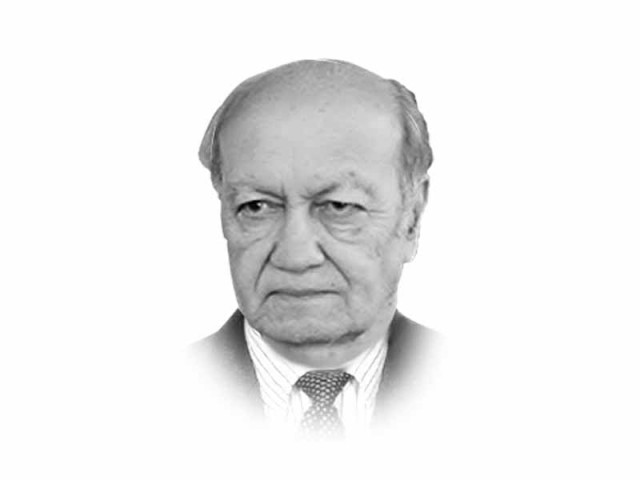We all are part of the problem and part of the solution
Without political ownership, chances of bringing peace and stability in the long term become more difficult

The writer is a retired lieutenant general of the Pakistan Army and a former federal secretary. He has also served as chairman of the Pakistan Ordnance Factories Board
It is in this backdrop that the recent Corps Commander’s address at the National Defense University should be viewed. Like most segments of society, the army high command is deeply frustrated and concerned with the current state of affairs, especially as these relate to Sindh and Karachi. In essence, the speech is both a warning and a prescription to stop and reverse the anarchic conditions that Karachi and the province have been experiencing for several years. The prescription first analytically identifies the problems that have given rise to the decay in governance and the law and order situation, and lays down the path for institutional and policy correction. There is an implicit warning to the provincial government and political parties that the current state of affairs is unacceptable. Failure to take heed would invite a strong response through the imposition of governor’s rule in Karachi; although after the 18th Amendment, the decision to impose governor’s rule rests with the provincial assembly.
In this murky and fluid scenario, the latest revelations by the army chief and our intelligence agencies of the extensive penetration of RAW’s involvement in Karachi, Balochistan and the tribal areas, raises the level and complexity of the challenge. How have our counter-intelligence services remained unaware of such a major development until so late? Besides, by pointing fingers at RAW for the massacre of the innocent and peace-loving Ismaili community, are we not deflecting attention from Jundullah, which owned the incident and whose footprint is more apparent? To what extent will the international community and especially the major powers be supportive or sympathetic towards Pakistan’s viewpoint even if they are convinced that India is involved in supporting dissident elements? If the history of India’s suppression of the Kashmiri freedom struggle is any indication, then for the West, political expediency and maintaining the goodwill of India take precedence over Pakistan’s just claim for support.
In the event that governor’s rule is imposed in Sindh, the question is, how will it play out in terms of bringing stability to the metropolis? Governor’s rule can be useful up to a point by cutting bureaucratic red tape and is free of political compromises. But past experience has shown that the advantage is short-lived. Soon new sets of problems emerge that push the old ones in the background that resurface after a while. When political parties are sidelined, they are not only alienated but the political process also gets throttled. Without political ownership, chances of bringing peace and stability in the long term become more difficult.
At the same time, this situation cannot continue where the authority of the state is minimal or practically non-existent. An extremely dangerous trend that is being either deliberately ignored or is a reflection of the casual attitude of the state towards human life and its institutions, is the increasing frequency with which high-profile individuals, including those from the police force, are being targeted in Karachi. And there seems to be no effort on the part of the Sindh government to apprehend the criminals and bring them to justice. Moreover, the police, especially in Sindh and Punjab, are frequently eliminating wanted criminals in fake encounters. We should have learnt from our experience that police brutality only breeds more public frustration. All this reflects sadly on the provincial government that has failed to develop an efficient police force capable of providing security to its people.
As authentic reports indicate, militancy is taking deep roots in Punjab as well, but the provincial and federal governments are tolerating it. Most militant groups have informal connections with the ruling party so it is considered expedient to coexist with them. There is such marked difference between how the terrorists are treated in other provinces and in Punjab and Islamabad. Salmaan Taseer’s murderer is beyond the pale of law. He is being protected by the state without any justification. A different yardstick of justice is applied while dealing with Maulana Aziz.
In Pakistan, what is completely missing is a concept that peace and security, and economic progress and political stability cannot be achieved in a moral and ethical vacuum. This is not just the result of prolonged military rule but also a consequence of the values that our civilian leadership professes. So it is not just the politicians, but all institutions, which will have to work in unison towards the solution.
Published in The Express Tribune, May 20th, 2015.
Like Opinion & Editorial on Facebook, follow @ETOpEd on Twitter to receive all updates on all our daily pieces.















COMMENTS
Comments are moderated and generally will be posted if they are on-topic and not abusive.
For more information, please see our Comments FAQ